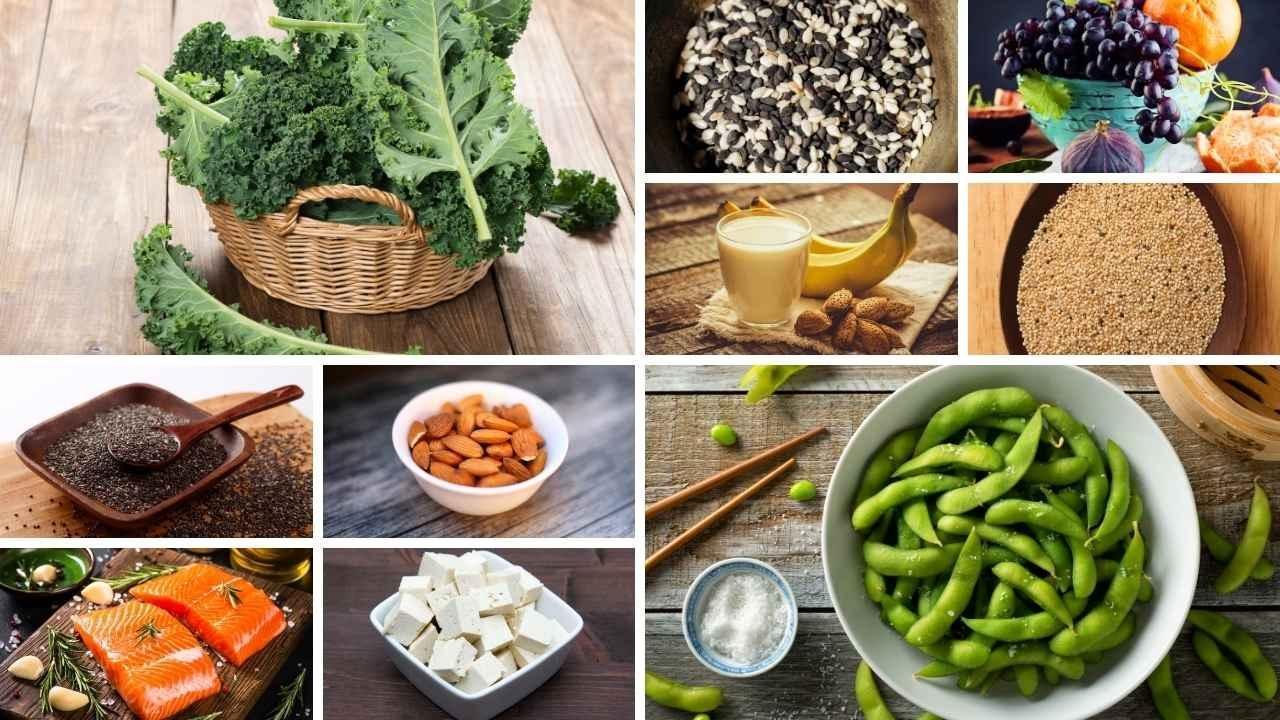You have not yet added any article to your bookmarks!

Join 10k+ people to get notified about new posts, news and tips.
Do not worry we don't spam!

Post by : Mikael Ariff
Calcium is essential for everyday health: it underpins bone and tooth strength, supports muscle contraction, and helps nerves and the heart function smoothly. While dairy products are a familiar source, many other everyday foods pack substantial calcium without relying on milk or cheese.
Whether you follow a plant-based diet, avoid lactose, or simply want to widen your options, you can incorporate a variety of calcium-rich ingredients. They are accessible, versatile in recipes, and effective at helping maintain bone health and overall vitality.
Below are ten notable foods high in calcium you can add throughout the day, from breakfast bowls to evening meals.
Tiny but nutrient-dense, chia seeds deliver a notable amount of calcium—about two tablespoons supply close to 18% of daily needs. They also supply fiber, plant protein and omega-3s. Use them in smoothies, make chia pudding, or sprinkle them over fruit and yogurt for texture and lasting fullness.
Almonds offer a crunchy, calcium-rich snack option—roughly a small handful contains around 75 mg of calcium—alongside healthy fats, vitamin E and magnesium. Enjoy them raw, chopped into cereals, or as almond butter on toast for a quick nutrient boost.
For seafood eaters, canned sardines and bone-in salmon are excellent calcium sources because their edible bones are mineral-dense. About 100 g of sardines can provide over 300 mg of calcium. These fish also contain vitamin D, which aids calcium absorption. Try them in salads, sandwiches or pasta dishes.
Tofu prepared with calcium salts (calcium-set) can be a significant source of calcium—small portions may deliver around 350 mg. Rich in plant protein and minerals, it suits vegetarian and vegan diets well. Stir-fry, add to soups, or blend into smoothies for a versatile protein option.
Leafy greens such as kale, spinach and bok choy contain meaningful calcium along with vitamin K and antioxidants that support bone health. A cup of cooked kale provides approximately 170 mg of calcium. Toss them into salads, soups or sandwiches to brighten both flavor and nutrition.
Despite their small size, sesame seeds are a potent calcium source—one tablespoon supplies nearly 90 mg. Sprinkle them on grains, salads or toast, or use tahini (sesame paste) in dips and dressings to add a creamy, mineral-rich element to meals.
Edamame, young soybeans, are easy to prepare and provide about 100 mg of calcium per cooked cup. They also bring protein, fiber and vitamin K to the table. Serve steamed as a snack, or mix into salads and grain bowls for extra texture and nutrients.
For those avoiding cow’s milk, many almond, soy and oat milks are fortified with calcium and vitamin D to match the levels found in dairy. One cup of fortified plant milk typically approximates the calcium content of regular milk—check labels and shake containers before use to ensure even distribution.
Amaranth is an ancient, gluten-free grain rich in minerals like calcium, magnesium and iron. One cooked cup contains about 115 mg of calcium. Use it as porridge, in salads, or as a side grain to diversify meals beyond rice or wheat.
Certain fruits also contribute calcium—an orange offers around 60 mg, while five dried figs supply roughly 135 mg. These fruits provide vitamin C as well, which can help with calcium absorption. They make convenient, flavorful additions to a bone-supporting diet.
Beyond building and maintaining bone mass, calcium plays a role in muscle contractions, blood clotting and maintaining a regular heartbeat. If intake is insufficient, the body may withdraw calcium from bone stores, potentially raising the risk of weakened bones and conditions such as osteoporosis over time. Regular dietary intake of calcium-rich foods is therefore important throughout life.
Combine calcium-containing foods with vitamin D sources—such as fatty fish or eggs—to promote uptake.
Limit excess caffeine and salt intake, which can impair calcium retention.
Stay well-hydrated across the day.
Rotate several calcium sources rather than relying on a single food to meet needs.
Incorporating a range of non-dairy, calcium-rich foods—from seeds and nuts to fortified milks and leafy greens—makes it straightforward to support bone health and overall wellbeing. You don’t have to depend solely on milk to meet your calcium needs; variety is both practical and nutritious.
Next time you plan meals, consider these often-overlooked sources of calcium and build them into a balanced eating pattern.
The content above is intended for general information and educational purposes only and does not constitute medical or nutritional advice. Individual needs vary by age, health status and lifestyle. Consult a qualified healthcare professional or registered dietitian before making major changes to your diet or supplement routine to ensure guidance is safe and appropriate for your specific circumstances.










Study Warns Using AI for Medical Advice Is ‘Dangerous’ as Users Get Inaccurate Health Guidance
A major new study reveals that artificial intelligence (AI) chatbots and tools may give misleading o

Top Sci-Fi Movies Streaming on Netflix This February: Must-Watch Picks for Genre Fans
A curated news-style guide to the best science fiction films currently available on Netflix in Febru

BCCI Central Contracts Shake-Up: Kohli, Rohit Moved to Grade B as Board Reshapes 2025–26 List
Virat Kohli and Rohit Sharma have been placed in Grade B in the BCCI’s 2025–26 central contract list

Dalal Street Spotlight: Top 10 Stocks Investors Are Watching as Markets Open on a High
Indian stock markets begin the week with strong momentum, and several blue-chip and mid-cap stocks a

Market Movers Today: Key Stocks Set To Watch In Indian Markets
Indian equity markets are poised for active trading as several major companies, including Bharti Air

Milan Welcomes the World: Inside the Grand Opening Ceremony of the 2026 Winter Olympics
The 2026 Winter Olympics opening ceremony in Milan marked a defining moment for global sport, blendi